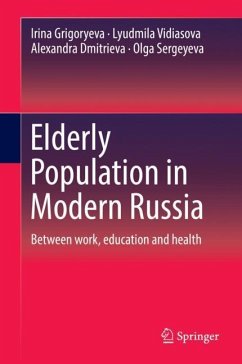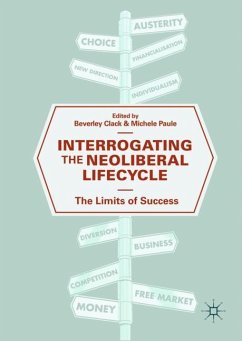
Aging in Comparative Perspective
Processes and Policies
Versandkostenfrei!
Versandfertig in 6-10 Tagen
76,99 €
inkl. MwSt.
Weitere Ausgaben:

PAYBACK Punkte
38 °P sammeln!
This book examines the key aging processes in seven countries (United States, United Kingdom, Sweden, Japan, China, Nepal, and South Africa) and the main policies that have been, and are being, developed to deal with this rapid change in the demographic profile. It addresses the problems that are identified as well as the positive aspects of aging within each of these contrasting societies. Thus it makes a significant contribution to the major debates about growing old across the globe. Aging in Comparative PerspectiveProcesses and PoliciesIan G. Cook and Jamie HalsallPeople are living longer ...
This book examines the key aging processes in seven countries (United States, United Kingdom, Sweden, Japan, China, Nepal, and South Africa) and the main policies that have been, and are being, developed to deal with this rapid change in the demographic profile. It addresses the problems that are identified as well as the positive aspects of aging within each of these contrasting societies. Thus it makes a significant contribution to the major debates about growing old across the globe. Aging in Comparative Perspective
Processes and Policies
Ian G. Cook and Jamie Halsall
People are living longer in particular, the over-85 population is increasing in many countries around the globe. But while this fact should be considered a proud testament to improved standards of living, it is often lost in contentious debates over the state of health care and the future of benefit programs.
Aging in Comparative Perspective explores this complex scenario on a world scale, as the global recession drives political change and shifts in cultural traditions. This timely volume analyzes the aging process in various countries, with special focus on the stresses placed on their economies as the numbers of elders increase with fewer young people available to support them due to declining birthrates. The authors review elder policies, such as entitlement programs, that have been put into place, are being considered, or are in danger of being curtailed. At the same time, helpful light is shed on another side of the elderly that receives less attention: active, independent, and benefiting their families and communities. This ongoing evolution is presented in national and global context in seven representative countries: U.S., U.K., Japan, Sweden, China, South Africa, and Nepal.
Aging in Comparative Perspective makes a major contribution to our understanding of the wider impact of growing old, and will find interested readers among gerontologists, sociologists, public health policymakers, and anthropologists.
Processes and Policies
Ian G. Cook and Jamie Halsall
People are living longer in particular, the over-85 population is increasing in many countries around the globe. But while this fact should be considered a proud testament to improved standards of living, it is often lost in contentious debates over the state of health care and the future of benefit programs.
Aging in Comparative Perspective explores this complex scenario on a world scale, as the global recession drives political change and shifts in cultural traditions. This timely volume analyzes the aging process in various countries, with special focus on the stresses placed on their economies as the numbers of elders increase with fewer young people available to support them due to declining birthrates. The authors review elder policies, such as entitlement programs, that have been put into place, are being considered, or are in danger of being curtailed. At the same time, helpful light is shed on another side of the elderly that receives less attention: active, independent, and benefiting their families and communities. This ongoing evolution is presented in national and global context in seven representative countries: U.S., U.K., Japan, Sweden, China, South Africa, and Nepal.
Aging in Comparative Perspective makes a major contribution to our understanding of the wider impact of growing old, and will find interested readers among gerontologists, sociologists, public health policymakers, and anthropologists.














